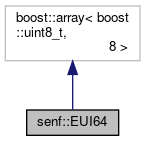EUI-64 data type. More...
#include <senf/Socket/Protocols/Raw/EUI64.hh>

Public Member Functions | |
| bool | isMACCompatible () const |
true, if EUI64 is MAC compatible, false otherwise More... | |
| bool | local () const |
true if the local bit is set, false otherwise More... | |
| bool | group () const |
true if the group bit is set, false otherwise More... | |
| operator bool () const | |
true, if EUI64 is != 0, false otherwise More... | |
| boost::uint64_t | uint64 () const |
| Return EUI64 as integer number. More... | |
Related Functions | |
(Note that these are not member functions.) | |
| std::ostream & | operator<< (std::ostream &os, EUI64 const &v) |
| Write out EUI64 in it's string representation to stream. More... | |
| std::istream & | operator>> (std::istream &is, EUI64 &v) |
| Read EUI64 string representation from stream. More... | |
Structors and default members | |
| static EUI64 const | None |
| The empty (0) address. More... | |
| EUI64 (boost::uint64_t v=0u) | |
| Construct EUI-64. More... | |
| EUI64 (senf::NoInit_t) | |
| Construct uninitialized EUI-64. More... | |
| static EUI64 | from_mac (MACAddress const &mac) |
| Construct EUI-64 from senf::MACAddress. More... | |
| static EUI64 | from_string (std::string const &s) |
| Construct EUI-64 from string representation. More... | |
| template<class InputIterator > | |
| static EUI64 | from_data (InputIterator i) |
| Construct EUI-64 from 8 data octets. More... | |
Detailed Description
EUI-64 data type.
An EUI-64 is a 64 bit (8 octet) id. The id is represented as an 8 byte sequence in network byte order. An EUI64 can be converted from/to several other representations
boost::uint64_t | senf::EUI64(0x1a2b3c4d5f607182ull)eui64 .uint64() |
std::string | senf::EUI64::from_string("1a:2b:3c:4d-5f:60:71:82")senf::str(eui64) |
| raw data (8 bytes) | senf::EUI64::from_data(iterator)eui64 .begin() |
| senf::MACAddress (aka EUI-48) | senf::EUI64::from_mac(mac-address)senf::MACAddress::from_eui64(eui64) |
Since senf::EUI64 is based on boost::array, you can access the raw data bytes of the address using begin(), end() or operator[]:
\see <a href="http://tools.ietf.org/html/rfc4291">RFC 4291</a>
Constructor & Destructor Documentation
◆ EUI64() [1/2]
|
explicit |
Construct EUI-64.
◆ EUI64() [2/2]
|
explicit |
Construct uninitialized EUI-64.
Member Function Documentation
◆ from_data()
|
static |
Construct EUI-64 from 8 data octets.
The iterator i must point to a sequence of 8 octets in network byte order.
◆ from_mac()
|
static |
Construct EUI-64 from senf::MACAddress.
◆ from_string()
|
static |
Construct EUI-64 from string representation.
The string representation consists of 8 octets in hexadecimal notation separated by ':' or '-'
- Exceptions
-
senf::AddressSyntaxException
◆ group()
| bool senf::EUI64::group | ( | ) | const |
true if the group bit is set, false otherwise
The group bit is the least significant bit of the first octet (bit 7 in standard RFC bit numbering).
◆ isMACCompatible()
| bool senf::EUI64::isMACCompatible | ( | ) | const |
◆ local()
| bool senf::EUI64::local | ( | ) | const |
true if the local bit is set, false otherwise
The local bit is the second least significant bit of the first octet (bit 6 in standard RFC bit numbering).
◆ operator bool()
|
explicit |
true, if EUI64 is != 0, false otherwise
◆ uint64()
| boost::uint64_t senf::EUI64::uint64 | ( | ) | const |
Return EUI64 as integer number.
Friends And Related Function Documentation
◆ operator<<()
|
related |
Write out EUI64 in it's string representation to stream.
◆ operator>>()
|
related |
Read EUI64 string representation from stream.
Member Data Documentation
◆ None
|
static |
The documentation for this struct was generated from the following files: